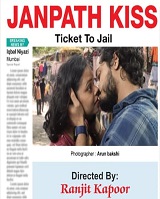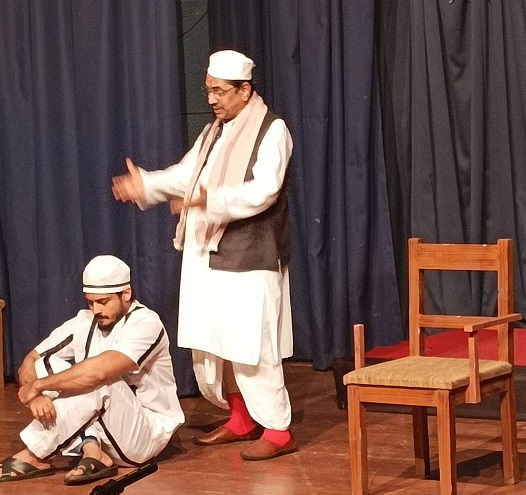|
|
||
|
Pro Tools
FILMFESTIVALS | 24/7 world wide coverageWelcome ! Enjoy the best of both worlds: Film & Festival News, exploring the best of the film festivals community. Launched in 1995, relentlessly connecting films to festivals, documenting and promoting festivals worldwide. Working on an upgrade soon. For collaboration, editorial contributions, or publicity, please send us an email here. User login |
Janpath Kiss, play review: Kiss and miss
Janpath Kiss, play review: Kiss and miss Staged in testing circumstances, Janpath Kiss, a full-length play in Hindustani, provided its share of laughs and satirical commentary on the contemporary socio-legal scene in India, particularly New Delhi. With a huge cast and three musicians seated on stage, it appeared to be under-rehearsed and a bit longer than necessary, considering there was no intermission or act division. Showing patches of imaginative theatrical ideas, it started on the wrong foot, with the narrator, who plays a still photographer, addressing the audience and forgetting dialogue. But once it went underway, it had some good moments to offer. Janpath Kiss was staged by Kirdaar Art Academy at the mini auditorium of Ravindra Natya Mandir, 3rd Floor, Prabhadevi, Mumbai, on the eve of 08 October. Janpath is the name of an area in New Delhi and, literally translated, means ‘People’s Road’. The kiss in the title remains an enigma. From first impressions, this is a story cooked-up by a scoop photographer named Arun Bakhshi, who is loitering around in search of a sensational picture, at Janpath, during the lunch-hour. An attractive working woman, employed as a receptionist in the Petroleum Corporation of India, Meera Chandani, just walks up to Sadanand Mishra, a Civil Engineer, who is standing quite far from her, and he grabs her face and kisses her. He is arrested for indecent behaviour in public, and the two are taken to a nearby policed station, in different vehicles. Meera is subjected to a volley of sexist comments and remarks by two policemen, and even the Inspector on duty concludes that she is call girl, and has levelled charges against Sadanand because they did not agree on a price. But what really happened is not clear. It is revealed that she raised an alarm and tried to beat Sadanand with her sandal, even as the police van arrived, to take him into custody. But why did she go up to him? Did they know each other? Sadanand maintains a stoic silence and refuses to utter even one word in custody. To help him, a politician, a Member of Parliament, RamaShankar Tiwari (RST) arrives at the prison. It turns out Sadanand is known to RST for many years and had worked for RST in his last election campaign. He gives a long speech to Ramchandra, recalling all their days together, but Sadanand remains absolutely mum. RST even offers to engage a top advocate who will ensure that Sadanand goes scot-free. When produced in court, starts talking freely, and confesses to his crime, while the advocate, Awadh Bihari, tries to establish that the incident occurred because of a temporary bout of insanity. The incident, however, causes great harm to Meera’s reputation, who is seen as tainted, by the police as well as her own parents.
Written by directed by Ranjit Kapoor, based on a novel by Akhilesh Jha, with Kirdaar Art Academy’s head, Iqbal Niyazi as Associate Director and actor (he played RST), the play was uneven. Very good use of the props and an over-the-top theme comic music for every entry of RST, were some of the highlights. Also commendable were the freezes, when hardly anybody moved, for a considerable stretch of time, and the excellent use of standee billboards. Some characters forgot pieces of dialogue and prompting from the wings was clearly audible. The auditorium has hardly any space for wings, and entries and exits suffered as a result. Add to that the fact that the group got possession of the hall only 30 minutes before the show was to commence, hardly sufficient to arrange props, lights and sound. Deft little touches adorned the play: Sadanand is auctioned to the highest bidder for taking a girl in marriage (a scathing commentary on the custom still prevalent in certain parts of India), Sadanand’s wife behaving like a cow, the image enhanced by the tinkling of bells (another scathing commentary), the woman taking the initiative in having regular sexual relations with her husband, and the incestuous (almost) scene between the daughter-in-law and father-in-law. On the other hand, one felt there was an overdose of profanities, especially by RST. But then, I guess that is common these days, with OTT content coming on no holds barred. The dialect spoken, mainly by RST seemed a bit unclear, perhaps a mixture of several dialects, including Poorbee and Bhojpuri. Veterans Ranjit Kapoor (who could not attend due to ill health) and Iqbal Niyazi are past-masters. Ranjit has directed Begum Ka Takiya, Kuru Kuru Swaha, Auntiyon Ka Tehqhana, Mukhya Mantri, Wrong Turn, Short Cut, Bichchhoo, Kauva Chalaa Hans Kee Chaal, Sher Afghan, Ek Ghoda Chheh Savaar, Bakree, Qhoobsoorat Bahu, Chaandee Ka Joota, Paer Taley Kee Zameen, and many more. A popular name in film credits too, he has written dialogue for films like Jaane Bhi Do Yaro, Lajja, The Legend of Bhagat Singh (additional dialogue), Woh Saat Din, Ek Ruka Hua Faisla, Kabhi Haan Kabhi Na and Bandit Queen. Iqbal Niyazi has been involved with theatre for 40 years. He founded Kirdaar Art Academy in 1982. A recipient of two national and 80 state awards, he achieved a lot of acclaim for his play Aur Kitney Jallianwala Baagh, in 1982. An additional accomplishment is that he has directed a documentary on Agha Hashr Kashmiri, the Indian Shakespeare, who ruled the theatre circuits in the 1920s, 30s and 40s, with his Urdu plays. Also an author, he has penned six books, one of which contains 100 plays for children. Dr. Naaz, is the Vice-Chairperson of Kirdaar Art Academy. Courtroom scenes and police station scenes were not convincing and probably need to be re-written. Why do all policemen have to be either clowns or totally corrupt? The corrupt bit can still pass, but why the clowning? There is no rationale for Sadanand to remain speechless for about half the play. The photographer as the ‘sootradhaar’ (narrator) was very awkward. Very often, actors stood straight and turned their heads awkwardly to address another member of the cast. One wonders why were there so many lapses of memory and the fact that some characters seemed un-rehearsed. It is highly likely that some stand-ins were asked to step into the shoes of the regular actors, at the last minute. Performances, probably a result of the preceding predicament, were varied, from the confident to the sporadic. The dream-like, almost ballet-like sequence, featuring Meera and Sadanand was a tour de force.
Shiv Sharma impressed as Sadanand, even when he had no dialogue. Tejashree as Meera was a little circumspect and slightly mechanical. Looks-wise, she did not answer to the name Meera Chandani. As RST, Iqbal Niyazi had a great time. He wasn’t uncomfortable mouthing the colourful vocabulary, but needed prompting, probably because he must have spent much more time on other duties as Associate Director and as Chairperson of Kirdaar Art Academy, and less time on memorising the unduly long monologues. Hopefully, this will go, with more rehearsals and shows. Navin was good as Brahmanand, father of Sadanand, Saurabh hammed as the Station House Officer (SHO, policeman on duty at the station), though I wonder what else could he do, given the character? The two clowning policemen were Aryan and Sumanta. Judge Satish needs to work on his diction, while Swapnil did not convince as the advocate. Arun Bakhshi was played by Rohit, who needs to do a lot of homework, unless he was a last-minute stand-in. A good start and a good end, which both featured Rohit, are a must for every play. There were two 'eunuchs' in the play, played by the same actors who played the clowning cops, Aryan and Sumanta, and they deserve a big thumbs-up. Other credits include Dr. Naaz Khan as Head of Production and costume designer, live music by Ratan Lal (one well-written song, rather long) and Rudra Tej, lights operator was Praful Derekar, choreographer was none other than Tejashree herself, and poster design by Altamash. Janpath Kiss has an attractive title and a large canvas. If it can get over teething problems, it has the potential to hold the audience and provide both entertainment and biting satire in one package. Just under 105 minutes long, it could do with some pruning. It’s all about a kiss, but some things it does miss. Once the kiss and the miss come together, it can be as rewarding as lip-locking…a real kiss. 11.10.2022 | Siraj Syed's blog Cat. : Dr. Naaz Iqbal Niyazi Ranjit Kapoor Independent FILM
|
LinksThe Bulletin Board > The Bulletin Board Blog Following News Interview with EFM (Berlin) Director
Interview with IFTA Chairman (AFM)
Interview with Cannes Marche du Film Director
Filmfestivals.com dailies live coverage from > Live from India
Useful links for the indies: > Big files transfer
+ SUBSCRIBE to the weekly Newsletter Deals+ Special offers and discounts from filmfestivals.com Selected fun offers
> Bonus Casino
User imagesAbout Siraj Syed Syed Siraj Syed Siraj (Siraj Associates) Siraj Syed is a film-critic since 1970 and a Former President of the Freelance Film Journalists' Combine of India.He is the India Correspondent of FilmFestivals.com and a member of FIPRESCI, the international Federation of Film Critics, Munich, GermanySiraj Syed has contributed over 1,015 articles on cinema, international film festivals, conventions, exhibitions, etc., most recently, at IFFI (Goa), MIFF (Mumbai), MFF/MAMI (Mumbai) and CommunicAsia (Singapore). He often edits film festival daily bulletins.He is also an actor and a dubbing artiste. Further, he has been teaching media, acting and dubbing at over 30 institutes in India and Singapore, since 1984.View my profile Send me a message The EditorUser contributions |






























